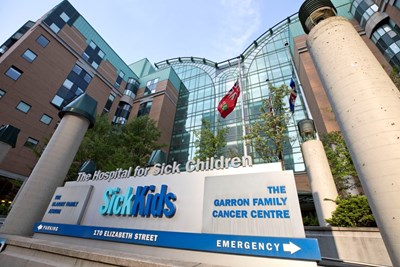News & Stories
Read the latest news and stories in the SickKids newsroom. Looking to interview someone? Connect with our media team.

June 25, 2015
PTSD soldiers more likely to see a world full of threat
The study involved a group of Canadian Armed Forces soldiers: half with PTSD, half without, and all on active duty.

June 19, 2015
SickKids-Caribbean Initiative supports World Sickle Cell Disease Awareness Day
Sickle cell disease is a hereditary blood disorder which causes abnormal haemoglobin - the protein in red blood cells that carry oxygen from the lungs to the body’s tissues.

June 18, 2015
Eating disorders experts weigh in on Avoidant/Restrictive Food Intake Disorder (ARFID) – two years after classification as a mental health condition.

June 17, 2015
Adjusting feeding practices in young children may help prevent iron-deficiency anaemia
Researchers at SickKids and St. Michael’s Hospital conducted a study that identified risk factors and recommendations to prevent severe iron-deficiency anaemia, in which blood lacks enough healthy red blood cells to carry oxygen to the body's tissues.

June 16, 2015
New gene identified as a cause of a form of brittle bone disease
In studying two unrelated patients with a form of the condition associated with muscle weakness, researchers identified changes in a gene not previously linked with human disease.

June 12, 2015
Government of Ontario grants more than $10.6 million of funding to SickKids research
The Government of Ontario announced its $209 million investment in research funding to support innovative projects and leading talent at research institutions across the province.

June 12, 2015
Research Institute Retreat: Celebrating Janet Rossant’s Scientific Legacy
At the 26th annual Research Institute Retreat there was no theme more fitting than to celebrate Janet Rossant’s scientific legacy.

June 11, 2015
Prenatal screening varies significantly based on where women live and who provides their care
Women who live in urban areas, are from high income neighbourhoods and whose pregnancy care is provided by an obstetrician are more likely to receive prenatal screening, according to a new study by researchers at the Institute for Clinical Evaluative Sciences and SickKids.

June 9, 2015
SickKids recognizes siblings’ experiences in cancer journey with 4th annual Sibling Appreciation Day
On Saturday, June 6, Jacob, Noah and 18 other siblings of kids with cancer or other blood disorders were honoured at “It’s All About Me”, the 4th annual Sibling Appreciation Day at SickKids.

June 5, 2015
Cognitive challenges in some survivors of childhood leukemia linked with genetic variants
The study, published in the May 18 online edition of the Journal of Clinical Oncology, was conducted by researchers at The Children’s Hospital at Montefiore and Dana-Farber/Boston Children's Cancer and Blood Disorders Center, SickKids and the Children’s Hospital of Eastern Ontario.

June 2, 2015
Leading SickKids researchers receive more than $5.1 million in CFI funding
The Canada Foundation for Innovation announced new funding for research infrastructure and technology, including an investment in support of cutting-edge studies led by SickKids.

June 1, 2015
Bridging the gap: SickKids researchers work to bring traumatic brain injury research to the bedside
It’s the number 1 cause of death in children in Canada, yet there is still a long way to go before we fully understand how to translate research on traumatic brain injury into something we can use at the bedside.

